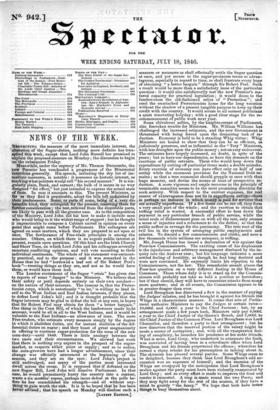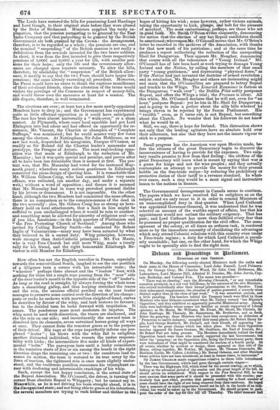NEWS OF THE WEEK.
RESPECTING the measure of the most immediate interest, the alteration of the Sugar-duties, nothing more definite has tran- spired this week, except that Lord John Russell has promised to explain the proposed measure on Monday ; the discussion to begin on the subsequent Friday. Meanwhile, under the urgency of Mr. Thomas Duncombe, the new Premier has vouchsafed a programme of the Ministerial intentions generally. His speech, including the dry list of im- mediate measures, is notable : it possesses an historic interest, as marking what painters would call "his second manner." It is sin- gularly plain, frank, and earnest ; the bulk of it seems in no way designed " for effect," but just intended to express the actual state of facts. In sum it amounts to this. The present Ministers, as far as they find it practicable, adopt the bills left, unfinished by their predecessors. Some, or parts of some, being of a very de- bateable kind, they relinquish for the present, reserving them for further consideration ; the rest, relieved from the disputable parts, are likely to pass with all the greater ease. As to the composition of the Ministry, Lord John did his best to make it include men who would bring to it the widest range of support ; but he thought it impracticable to compose a Cabinet united in opinion on every point that might come before Parliament. His colleagues are agreed on some matters, which they are prepared to act upon at once. The furtherance of Free-trade principles is among the 'number. Others, on which there is no urgent public interest at present, remain open questions. Of this kind are the Irish Church and Short Time, on which Lord John and his colleagues severally entertain conflicting opinions, and will vote according to their individual sentiments. The whole of his statement was eminent- ly practical, and to the purpose : and it was remarked in the House that he had " borrowed a leaf out of Sir Robert Peel's book "—treating things as they are, and not as he would have them, or would have them look.
The London excitement of the Sugar " crisis" has given rise to reports or some " danger " to the Ministry. We believe that their safety or peril depends entirely on their own conduct— on the nature of their measure. The rumour is, that the Protec- tionist corps, which is notoriously " to let," is willing. to lend it- self to the West Indian and East Indian interests, if they please, to defeat Lord John's bill ; and it is thought probable that the Sugar interests may be glad to defeat the bill at any rate, in hopes that Sir Robert Peel may obtain for them " a better bargain." One thing in the Corn Bill, of which the landowners made light account, would be all in all to the West Indians, and it would be valuable to the East Indians—an allowance of time. The mere Free-traders, who estimate every measure simply by the degree in which it abolishes duties, are for instant abolition of the dif- ferential duties on sugar ; and they boast of great magnanimity in offering to continue sugar-protection for the term of the new corn-duty—until 1849. There is little analogy between the two cases and their circumstances. We showed last week that there is nothing very urgent in the prospect of the sugar- market, as .respects either price or supply; and as to notice, the corn-growers have had a longer advertisement, since their change was officially announced at the beginning of the session, and they are on the spot : Lord John's project is still undivulged, and many of the parties most interested dwell across the ocean. It is supposed that if defeated on the new Sugar Bill, Lord John will dissolve Parliament. In that case, he would prematurely hurry the country into a contest, waste a six months' repose, perhaps incur defeat at the polls be- fore he has consolidated his strength—and all without any- thing to gain worth the risk. It is to be hoped that he has been better advised ; that his speech on Monday will disclose such a
measure or measures as shall effectually settle the Sugar question at once, and yet secure to the sugar-producers terms so advan- tageous, especially in regard to time, as shall frustrate every hope of obtaining " a better bargain" through Sir Robert Peel. Such a result would be more than a satisfactory issue of the particular question : it would also satisfactorily test the new Premier's ma- tured capacity for practical legislation ; it would doom to the lumber-room the old-fashioned relics of " Protection "; and send the unattached Protectionists home for the long vacation without the shadow of a present tangible purpose to keep up their credit with the country. It would secure to all earnest politicians a quiet renovating holyday ; with a good clear stage for the re- commencement of public work next year. Some chivalrous sallies, by the knights-errant of Parliament also foretoken trouble for Ministers. Mr. William Williams has challenged the increased estimates, and the new Government is threatened with being forced upon the despairing task of re- duction. Economy is held to be a standing Whig virtue : Whig Ministers are bound to show that they can be as efficient, as judiciously generous, and as influential as the "Tory" Ministers, with less draughts upon the public money ; not an easy endeavour. The estimates have largely increased, no doubt, in spite of the peace ; but so have our dependencies, so have the demands on the exertions of public servants. Those who would keep down the expenditure by cutting off particular items make a double mistake. Every exertion of economy can have effect only on half of our outlay while the enormous provision for the National Debt re- mains ; so that a true economist should grapple at once with that huge monster, and devise the means at least of prospective re- duction. A more vigorous and ample recourse to the principle of terminable annuities seems to be the most promising direction for such activity. With respect to the current expenses, the real source of extravagance does not lie in superfluous ouday—there is perhaps no instance in which money is paid for services that are actually superfluous. If a few items can be cut off, they form a very small part of the whole ; and the exertion to obtain that trifling -relief is wasted. A, successful effort to beat down the payment in any particular branch of public service, while the usual scale of disbursement goes on with all the rest, only creates a sense of injustice and a reluctance to do the duties ; so that the public suffers in revenge for the parsimony. The true root of the evil lies in the system of arranging public employments and salaries. To discard a few commissioners and clerks, and save a few thousands while millions are misspent, is trifling.
Mr. Joseph Hume has issued a declaration of war against the Poor-law Commissioners. The exciting cause of his displeasure is the injudicious and arbitrary mana,gement disclosed by the in- quiry into the Andover ease ; but his language indicates a more settled feeling of hostility, as though he had long doubted and were now convinced. He expressly limits his objection to the Commissioners, not the law. This remarkable assault places the Poor-law question on a very different footing in did House of Commons. Those whose duty it is to stand up for the Commis-. sioners will probably not take so bold a position as heretofore; but if they should, they will have to encounter attacks from many more quarters ; and at all events, the Commission appears to be in greater danger than ever. Lord Brougham has discovered a flaw in the manner of paying the Judges' salaries, and he has brought it against his friends the Whigs in a characteristic manner. It seems that acts of Parlia- ment authorize Ministers to pay the Judges at certain rates-- 10,0001. and 8,0001. a year to the Chief Justices : but, by an arrangement made a few years back, Ministers only pay 8,0001. a year to the Chief Justice of the Queen's Bench, and 7,0001. to the Chief Justice of the Common Pleas. Lord Brougham was Lord Chancellor, and therefore a party to that arrangement ; but he now discovers that the reserved portion of the salary might be made a source of corruption ; and, with all the exasperates feel- ing of complicity, he launches his penitence at his noble friends. What is more, Lord Grey, who undertook to extenuate the fault, was convicted of having been in a subordinate office when Lord Brougham and his friends perpetrated the offence ; wherefore he earned a sharp rebuke for his presumption in talking about it. The skirmish has pleased several• parties. Some Whigs seem to be delighted, because they think that Lord Brougham's odd ac- cusation was an exposure of himself; and the enemies of the Whigs are overjoyed by the anticipation that Lord Brougham's malice against the party must have been violently exasperated by Lord Grey ; and so every effort is made to improve the feud and render it immortal. A ring is made round the two Peers; and they may fight away for the rest of the session, if they have a mind to gratify " the fancy." We hope that 4oth have better things to busy themselves about.
The Lords have restored the bills for pensioning Lord Hardinge and Lord Gough, to their original state before they were altered by the Duke of Richmond. Ministers supplied the tardy ex- planation, that the pension purporting to be granted by the East India Company and that purporting- to be granted by the British Government are both granted by the Crown: the arrangement, therefore, is to be regarded as a whole.- the pensions are one, and the nominal " suspending " of the British pension is not really a defalcation from the rewards intended for the two brave soldiers. In short, it was from the first intended to give them respectively pensions of 5,000/. and 3,000/. a year for life, with smaller pen- sions for their heirs ; only the life and the reversionary allow- ances are charged upon separate accounts. To alter the bills, therefore, by abolishing the " suspension " of the British allow- ance, is merely to say that the two Peers should have larger life- pensions ; the sums already exceeding all precedent. Moreover, the Peers would have no cause to thank the captious munificence of their soi-disant friends, since the alteration of the terms would violate the privilege of the Commons in respect of money-bills, and would throw over the measures at least for a session. The idle dispute, therefore, is well terminated.



























 Previous page
Previous page